Note: This article contains references that may recall dating violence and sexual assault.
Boy meets girl: it’s a tale as old as time, and what transpires in its aftermath has long been the speculative work of artists across the arc of history – artists reacting to the zeitgeist of their era, often raising ruckuses as they depicted the ever-evolving relations between the sexes.
It’s no surprise then, that in an age of recharged feminism, when the fight against rape culture has surged to the forefront of society, Mamamoo’s “Décalcomanie” MV would be embroiled in a scandal regarding its portrayal of sexual relations. As previously discussed, it is widely believed that the new release has romanticized assault against women. The MV’s crime: including scenes of a man wrist-grabbing and wall-slamming members of Mamamoo, which culminate into a particularly aggressive moment of Solar being seized, pushed against an elevator wall, and kissed.
Netizens quickly responded to these scenes, raising eyebrows as well as opinions around the storyline’s potential to promote violence in relationships. While RBW Entertainment acted almost immediately by editing out the scene of Solar’s struggling, it is assumed they did so to quell the negative criticism. The brouhaha was addressed tepidly at their media showcase: Solar only commented that in producing the MV, they did not realize different angles may lead to different interpretations.
The issue was glossed over – because what more could Mamamoo easily say without inflaming people? Media reporting feeds off clickbait headlines and flashy soundbites; there was little room for RBW Entertainment to defend its artistic choices with nuance, or discuss the passive-aggressiveness that is often part of female sexuality. There was no space to cohesively connect the lyrics of “Décalcomanie” with its imagery and storyline.
It’s easy to isolate a particular flaw and make it the lens through which to judge a work of art as a whole, and this is exactly what too many have done by presuming the MV romanticizes sexual violence. But if we take a broader view of the release as a combined song and video, an alternate interpretation can be found in the contradiction of “Décalcomanie” having both confident lyrics and a storyline featuring seemingly passive women.

This contradiction arises because while women have more opportunities than ever to be sexually active today, they are still expected to pay lip service to traditional femininity by behaving like pure receptacles for male desire. And thus social expectations have formed the passive-aggressive woman portrayed in “Décalcomanie,” the queen of mixed signals — someone who knows exactly what she wants, but must coyly tiptoe around these impulses in a crippled mating dance. Her seduction is simultaneously proof of her confidence and evidence of her limitations as a woman.
In making sense of this conflict, the lyrics first and foremost must be examined. They are the source from which the MV’s storyline originates, and the place where the strong feelings of desire become apparent. As the chorus goes:
You and I, we kiss, I feel good
I’m trusting myself with you, I feel you
This is a little dangerous
Dangerous dangerous
I think I’ll cross a line
What is most important is the last bit of the chorus – “I think I’ll cross a line” – which shows a clear assertion of agency as the woman chooses what direction her night is about to go. Emboldened by her chemistry with this man, she presses forward with a sense of confidence.
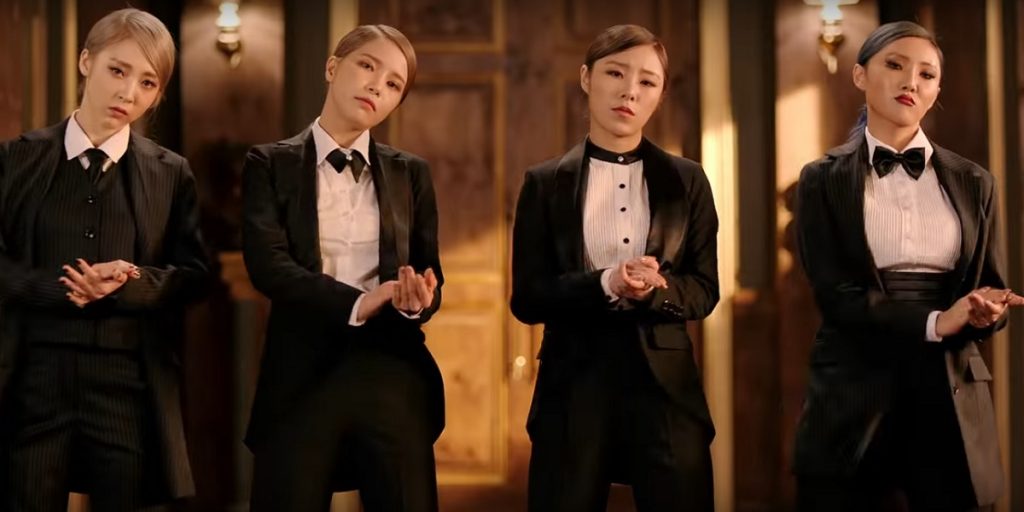
These feelings of strength are also represented consistently throughout the dance sequences in the “Décalcomanie” MV. For one thing, the cuts of the members dancing in tuxedo suits are a contrast to the scenes in tight dresses, opposites designed to showcase the inner confidence achieved by wearing provocative clothing – a sense of ‘I’m sexy and I know it.’
This is further affirmed when Mamamoo members dance facing reflections of each other. Mirrors symbolize self-scrutiny for women: to be able to pose, take selfies, and especially dance against them is to critically examine and approve of one’s own appearance. The imagery of “Décalcomanie” thus supports the positive feelings expressed in the song’s lyrics.
While some commenters have argued that the chorus line “this is a little dangerous” foreshadows fear of male aggression, what is ‘dangerous’ can be considered from various angles: perhaps it alludes to finally letting a man into your life, or simply letting a man see you naked. Danger is very much inherent to the vulnerability of entering any relationship with another person; it is excessive to link it to violence literally.
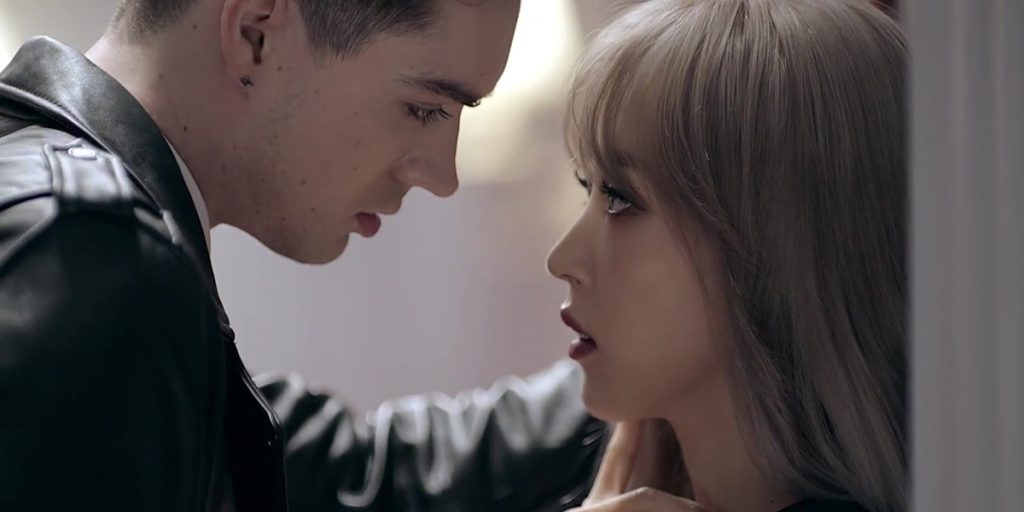
The delicate balance between feeling strong and desiring vulnerability plays out in the MV’s storyline when we study the camera’s attention to the gazing eye; there’s a disproportionate amount of time spent following the come-hither looks as Mamamoo members play cool, but try to bait out their man. The suspense builds as Moonbyul raps:
I’m nodding, I can’t breathe
I can’t control myself
I’m ready for you
(Mamamoo is coming back for you)
These lyrics point to a woman clearly doing her best to restrain herself, in spite of her desire to respond to the chemistry in the air. It speaks of waiting, preparing, and anticipating eagerly what is about to happen next.
It’s fair to ask why, then, it’s the man of the MV who finally reaches for the women first. But think about real life – is this generally not the case? Even when both parties are aware of mutual interest in each other, our gender norms expect the man to ‘man up’ and move with certainty, and the woman to be the passive recipient of his interests. It’s no wonder that the beat of “Décalcomanie” incorporates the sound of knocking; it’s the sound of a woman asking for her man to move his ass and open up already, dammit!
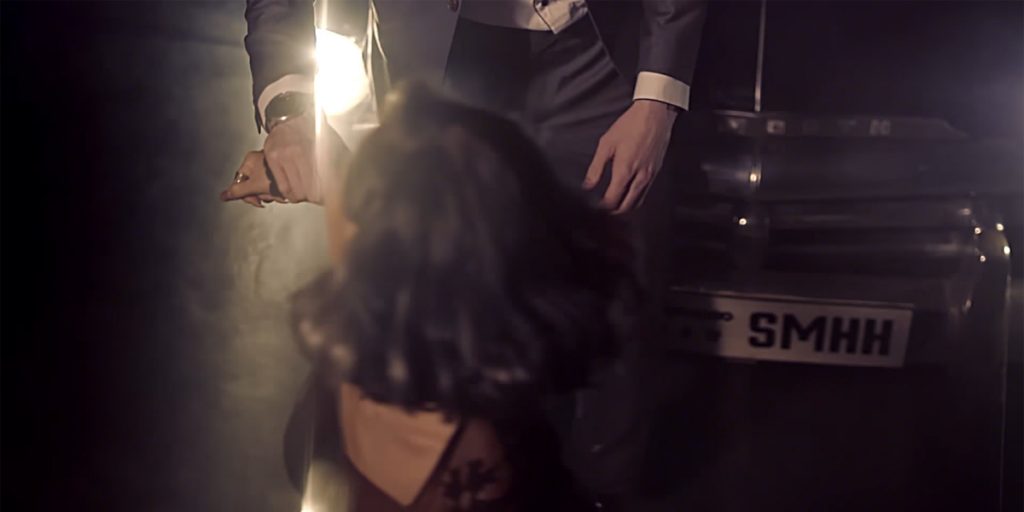
Take the scene where Hwasa struts towards her man, before turning away (rather theatrically) to avoid being overly direct. All that remains is for the man to take action, to grab her (equally theatrically) by the wrist and kiss her, finally (finally!) fulfilling her sexual desires. What is seen as violence here should instead be considered an exaggerated act, a hyperbolic gesture meant to underline the instance at which a man capitulates to a woman’s seduction. Whether or not the man’s actions have been rendered in an overly aggressive way needs to be discussed in the context of the MV director’s artistic choices.
But then there is the most egregious moment at which critics have cried foul: the frames where Solar is seized by the wrist and slammed against a wall, forearm struggling against the man’s grasp. I can see why there is a problem here – not necessarily because the scene is violent, but because it’s a clumsy detraction to the lyrics, imagery, and storyline where Mamamoo members confidently (but indirectly) seduce the man they want.
Again, for this I’ll blame the director and producers for not thinking carefully at the drawing board. They probably wanted a cheesy symbol to dramatize a woman’s inner conflict at the climactic moment, the final chance to continue sending mixed signals in a long night of playing hard-to-get: should I wait another hour, or text him now? Should I get in the taxi, or kiss him now? Should I stall a little more, or let him in now? And so they settled on the image of a struggling Solar – an erroneous choice that unfortunately evoked allusions to sexual assault, and set off the alarm bells of netizens around the world.
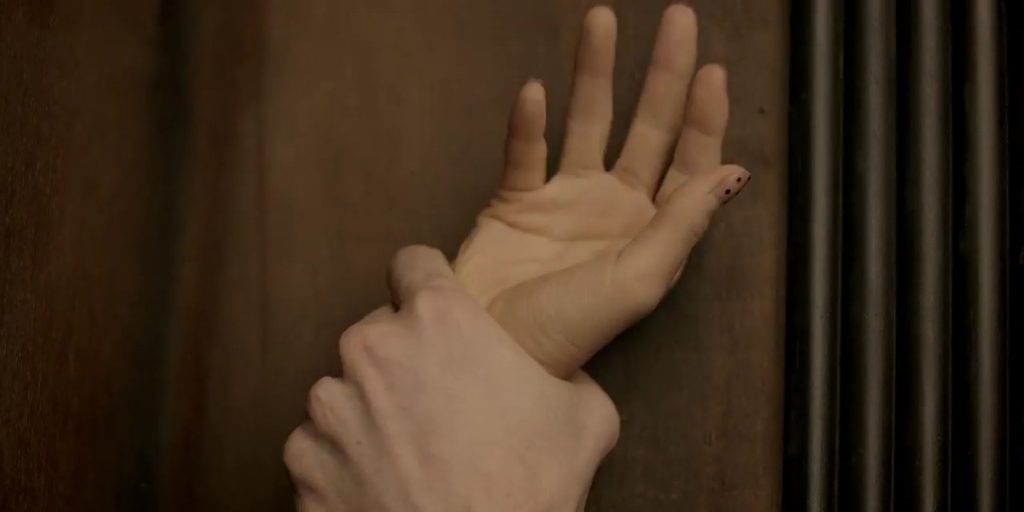
There is no question that Solar’s altercation is out of place in “Décalcomanie.” But it’s a glaring error precisely because it is so different from the rest of the MV. Following the kiss scenes we get a shot of the girls jumping gleefully in a shower of glitter, ostensibly celebrating their satisfying encounters with men. If Solar’s struggle was meant to romanticize a violent act against a woman, would it really sparkle so happily?
I agree with netizens in identifying her isolated scene as troublingly aggressive. But against the larger setting of the song’s package, this knee-jerk reaction has been blown out of proportion. Solar’s struggle does not change the fact that “Décalcomanie” is ultimately about the joys of finally connecting physically in a relationship.
Rather, the scandal has been able to gain traction because of the female seduction acted out by Mamamoo, in which mixed signals create a sexuality that is undeniably susceptible to assault due to its silence. And while I clearly demonstrate that the MV is trying to illustrate the positive fulfillment of desire through the baiting of men, I understand why most viewers would assume the climactic scenes were independent acts of male aggression – especially if they had not paid attention to the song’s lyrics.
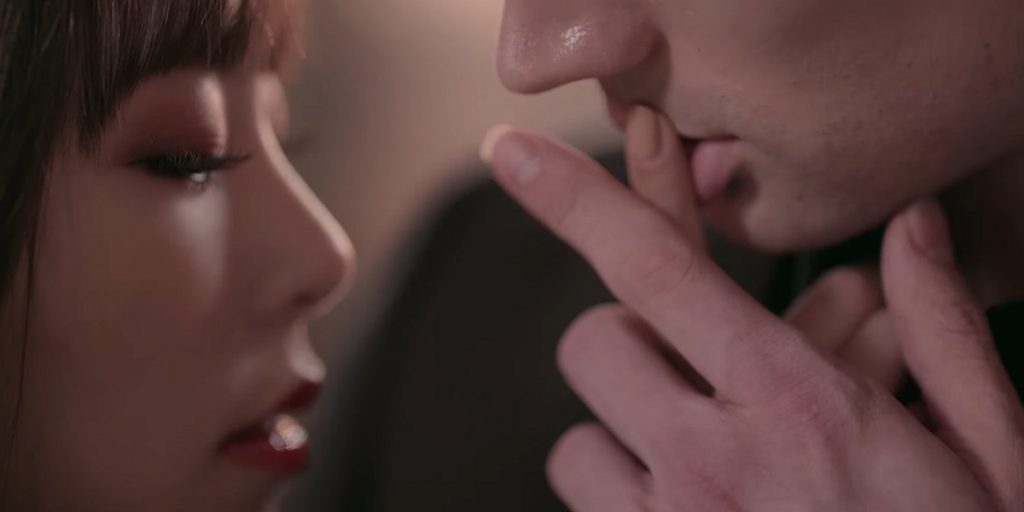
The widely held interpretation of “Décalcomanie” shows just how blurry the line between male action and male aggression is, and how quickly the tables can turn in the drama of a real life relationship. If anything, the proactive response from netizens shows that we need to think more broadly by also critiquing the social expectations that have muted and oppressed female sexuality.
It is also unacceptable for netizens to direct their ire towards only the women of Mamamoo. Rather than encouraging a misogynistic culture by pointing fingers at female idols, we must consider the role of the MV’s producers in generating overwrought scenes of aggression, and open conversations that interrogate gender norms in the creation of art. In the end, it is only when images of female passivity are no longer reproduced that we will be able to expect MVs where women truly feel good about their desires.
(The Grand Narrative, YouTube, Images via RBW Entertainment, Lyrics via pop!gasa, Yonhap News, Dispatch)


